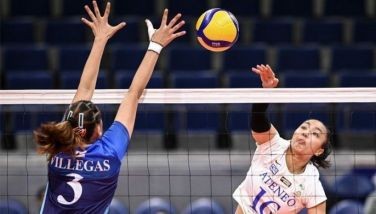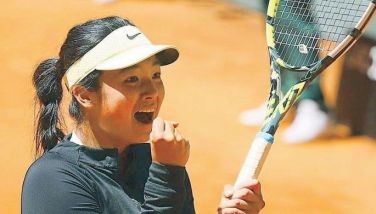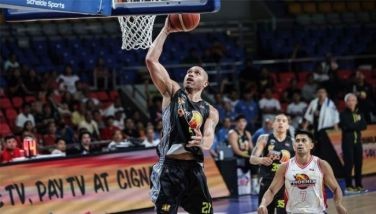Lessons from African athletes
Foreign athletes have always been a lightning rod for the Philippine sports community, usually when they win. For the last few years, there has been much discussion about the place of foreign athletes, specifically African athletes, in our collegiate sports leagues. Despite pre-existing rules allowing them to play (rules which have not yet been repealed), they are still the subject of scrutiny and insult, even though many of them perform better in school than many of their Filipino teammates.
Sam Ekwe, the six-foot eight center who helped break a 28-year NCAA men’s basketball drought for San Beda College, was one of the main sparks of this controversy. During his tenure, Ekwe evolved as a player and as a person. He was a target for intrigue and politicking, more so when the Red Lions were mopping the floor with their rival teams. His arrival, however, also sparked an invasion of African talent. Soon, aspiring athletes from Nigeria, Sudan, Cameroon, the Congo and other countries were hoping to get a free education and livelihood in the Philippines, trading off their size and physical strength. Most were unprepared for the additional challenges and stereotypes that faced them outside the playing arena.
To be fair, Ekwe was not the first foreign athlete to successfully play collegiate sports in the Philippines. Americans, Yugoslavians and even Chinese athletes have come to the country to study, attracted by lower costs, the language, the climate and the warmth of its people. These are also some factors that spurred the mass entry of Korean nationals into the country, which I’ll get to later.
But that is the dichotomy in Philippine culture. The famous writer Pearl S. Buck established a foundation worldwide for children left behind by American servicemen who were stationed at all the US military facilities overseas. As a reporter in 1986, the Pearl S. Buck Foundation (PSBF) Philippines caught my attention, since I was also searching for my biological father. Though he was never a serviceman, I could relate strongly to all the beneficiaries’ emotional pain and search for identity. In years of having been involved with the PSBF, I learned many shocking things about how Filipinos are towards race, and nobody talks about it. Being born Caucasian (as I was) was a double-edged sword. Some of the kids were considered the standards of beauty, and were pushed into modeling or acting. The dark side of this is that many of them became bar girls and prostitutes out of poverty.
On the other hand, the African-American children, who were born dark-skinned simply because their fathers were, were subjected to all sorts of physical and psychological harshness. One such unwanted child was chased around the house by an aunt with a pair of scissors. Others were beaten and called names. Most grew up hopeless and without self-esteem, and chose a similarly unworthy existence of living on the streets and drunkenness on alcohol or drugs. For the most part, our image of black people here is the buffoon, the clown, smiling with big white teeth and outrageous kinky hair for our amusement. A few have become tragic figures. And it is our fellow Filipinos – their fellow Filipinos – who did that to them.
This brings to the crux of the problem, a lack of understanding and relatability to these athletes who are just trying to create a life for themselves. Some critics – primarily from schools that have been losing to teams with African players – call them ringers, saying they were only recruited to play basketball, and so on. But aren’t all varsity athletes recruited nowadays? How many basketball players on college rosters are walk-ons? Virtually none. Schools from the provinces complain that their athletics programs have been held back fro decades because big schools from Metro Manila raid their teams once they’ve won medals in the Palarong Pambansa. So that criticism doesn’t hold water at all. The same standard applies to all athletes today, local or foreign.
Also, some of these players’ stories are quite poignant. They voluntarily uproot themselves from their homelands, travel thousands of kilometers to a strange land, and have no idea what they will be facing. Some people are afraid of them, some are intimidated by them. Other athletes who, like them, are merely trying to get by, insult them and try to hurt them or even disable them during games. For me, it is both ironic and sad that one of the most hospitable races in the world is capable of doing this to foreigners who see the value of freedom of education and trade in a democracy.
And that is not all. Many of them are the victims of pranks, a warped “initiation” perpetrated by coaches and teammates. They are taught foul language as if it were terms of endearment, which I’ve always thought was wrong. They are teased for their skin color and cultural mannerisms. But consider that many of them do not see their families for years because they can’t afford to go back home. As foreigners, they are unfamiliar with the economic landscape and do not know how to earn more through small business and thus become more dependent on their playing. Some are influenced to do thing they would not normally do because they have no other support system. Some are frustrated and homesick, and end up leaving the country with their dreams of a degree unfulfilled. But why is it that our youth in particular seem to willingly embrace Korean music and culture, some going so far as to learn the language just to be able to sing and to K-pop. Consider that the language and cultural disparity (including the absence of simple niceties like saying ‘Excuse me’), we generally treat them better. Is it simply because we look up to them because of their looks, even if we don’t understand their lyrics?
I’m no sociologist, but it is striking that a country that has co-opted the term “OFW” to replace “overseas contract worker”, we still have people who do not respect foreign nationals who are trying to do the same in our country. If we were in theirs, would we want to be treated this way? Granted, some of them gain moderate fame and even earn decently, but not right away, and not permanently. None of them will play in the PBA or represent the Philippines in international competition. They will still have to get jobs, earn a living and do everything on their own, blazing a new path to change their families’ past. If the rules change’ then they will have to leave and find another land of opportunity. But as the rules stand, then they deserve to be treated fairly, regardless of where they are from or what they look like.
- Latest
- Trending































